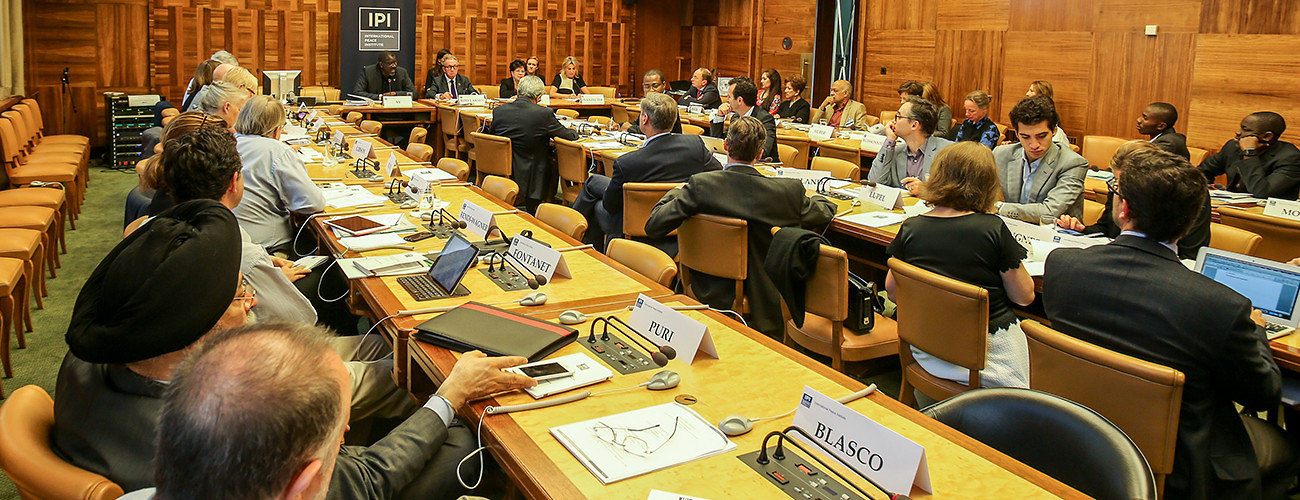On September 12, the International Peace Institute (IPI) convened a meeting on “Preparing for Pandemics” to facilitate a discussion on lessons learned from past experiences with dealing with pandemics, and ways of preparing more effectively for future outbreaks.
The meeting, which took place at the Palais des Nations in Geneva, brought together a diverse group of relevant experts including public health specialists, medical doctors, philanthropists, historians, as well as representatives of civil society, the military, UN Member States, and multi-lateral institutions.
In his opening remarks, IPI President Terje Rød-Larsen stressed the link between security and health. Pointing to how polio persists in a few unstable regions of the world—like parts of Afghanistan, Pakistan, Nigeria, Somalia and Syria—he said that “where there is instability, there is a greater risk of disease.” Therefore, the challenge is to reduce risk and increase resilience.
Dr. Margaret Chan, Director-General of the World Health Organization, and Dr. Elhadj As Sy, Secretary-General of the International Federation of the Red Cross also gave remarks, and both stressed how Ebola had tested the international community, and that more effective multilateral responses are essential for the future.
The first session recalled pandemics of the past like cholera, the Spanish flu, H1N1, polio and Ebola. It was observed that international cooperation and standardized procedures originated in efforts to control an outbreak of cholera in the mid-nineteenth century. The impact of war on the spread of diseases was also explained. Speakers identified factors that contribute to vulnerability and the spread of pandemics. The interface between humans and animals was given particular attention: an appeal was made for an international treaty on reporting viruses in animals that could have an impact on humans. The importance of early detection, increased surveillance and early action were highlighted, although it was noted that states are often hesitant to acknowledge the detection of a disease on their territory for fear of the economic and reputational costs. It was therefore discussed how to incentivize sharing information on pandemics at an early stage, and how to avoid states oscillating between denial and over-reaction. The issue was also raised on how to respect sovereignty while minimizing the transnational spread of diseases from countries that refuse international assistance. The importance of building trust at the community level was also emphasized.
The second session focused on lessons learned from dealing with Ebola and polio. Representatives from the (WHO) Polio Eradication Initiative, the armed forces of Pakistan and National Ebola Emergency Operations Center in Nigeria shared their first-hand experiences. Among the lessons learned were: pre-planning of an outbreak response plan; the need for a whole-of-government emergency response; appointment of a coordinator; establishment of an emergency planning and crisis response cell; sufficient human resources; innovative use of technology; the engagement of local actors; as well as a communications strategy. As demonstrated by the case of Pakistan, there may also be times when the military can play a key role in mobilizing its assets for emergency response.
The third session focused on actionable solutions. Discussants stressed the need for political commitment, capacity building in a way that encourages “brain gain” rather than “brain drain”, greater investment in healthcare systems, more research and development on effective vaccines (i.e., against influenza), and enhanced compliance with the WHO’s International Health Regulations. There was wide appreciation for the work of front line health workers.
The last session discussed policy recommendations for a more robust response to future pandemics. Speakers, including Dr. Chan and Mr. Sy, stressed the importance of transparency, leadership, coherence in policy, more effective use of technology, more open data sharing, well-trained front-line health workers, a culture of prevention, and the mainstreaming of health into development strategies. Participants also stressed the challenge of mobilizing an international emergency response when national capacities are overwhelmed. It was also suggested to formalize the relationship between the WHO and other parts of the UN system.
The meeting builds on IPI’s work on peace and health, particularly its cooperation with the Bill and Melinda Gates Foundation, to overcome the final barriers to the global eradication of polio. Recommendations from the meeting will also feed into the work of the Independent Commission on Multilateralism (ICM).








